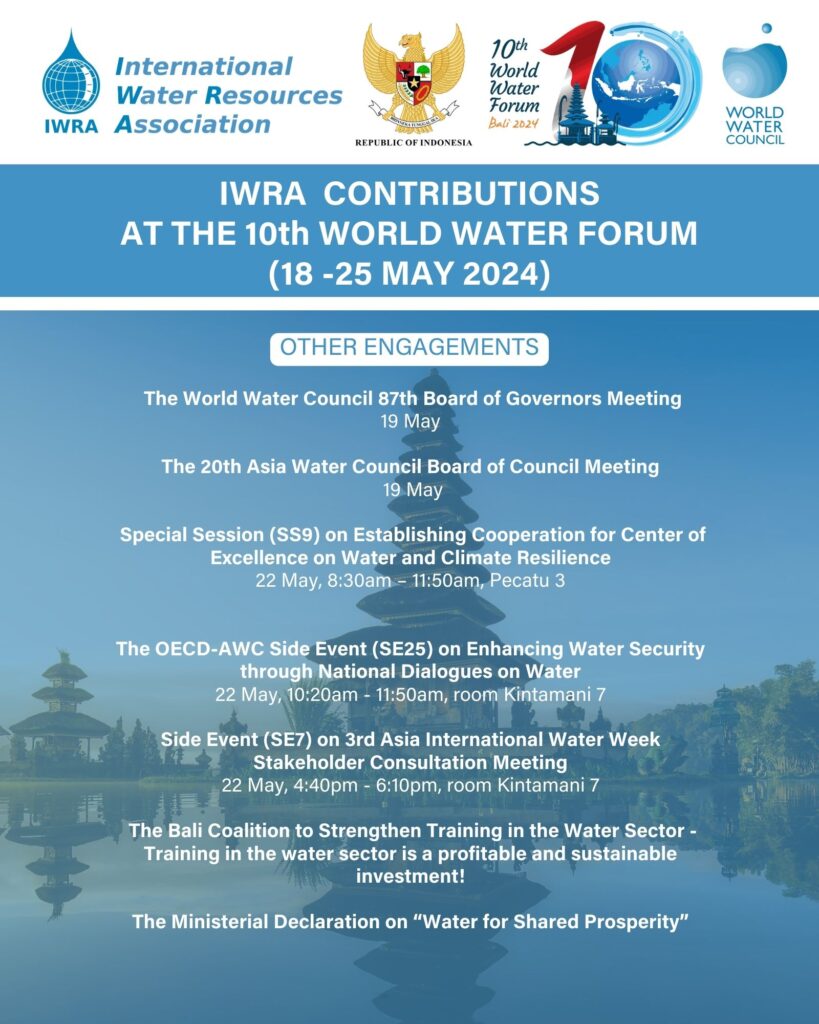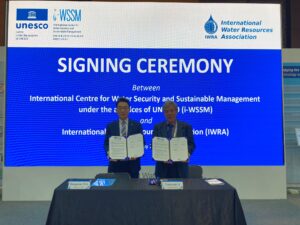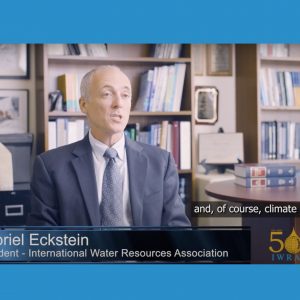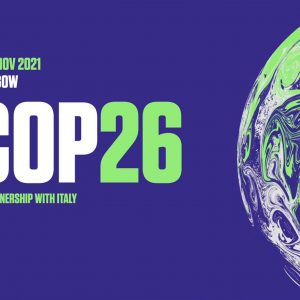
The International Water Resources Association (IWRA) contributed to High-Level panels, sessions, side-events, and activities at the recently concluded 10th World Water Forum, under the main theme “Water for Shared Prosperity.” The event took place from May 18th to May 25th, 2024, in Bali, Indonesia.
IWRA lead and contributed to key discussions promoting international exchange and cooperation in scientific research, technological innovation, policymaking, and management practice in water resources. These efforts focused on crucial areas and topics essential for a prosperous and equal water future for all.


Below is a detailed list of central High-Level Panels, dedicated thematic sessions on Smart Water Management and Water Quality, and a special session on Urban Water Management and Gender Equality, alongside other thought-provoking activities aimed at fostering common prosperity:
MONDAY, 20 MAY 2024
Challenges and Opportunities for Applying Smart Water Management: From Concept to Global Practice – 6A1
1:00 pm – 2:30 pm (CET +6), room Kintamani 5.
This introductory session discussed the main difficulties faced by countries, regions, cities, and rural locations. Using real and hypothetical cases, we will explore how smart technologies can address these water challenges and priorities. The session highlighted the crucial role of smart water management in responding to these issues on a global scale. This session was convened by IWRA.

Synthesis and Disseminating Innovations in Smart Water Management Worldwide – 6A2
4:40 pm – 6:10 pm (CET+6), room Kintamani 3
The discussed how smart water management innovations can help address challenges across various economies, sectors, countries, and cities. The focus will be on the most successful large-scale smart water management solutions, whether at the country, regional, basin, or city level. Additionally, it considered cost-effective aspects and factors for public authorities when making innovation decisions. This session was co-convened by IWRA, the Turkish General Directorate of State Hydraulic Works (DSI), and Aquafed.
TUESDAY, 21 MAY
Road Map for Water Quality Monitoring and Assessment: From ecological status assessment to planetary blue health under climate change – 2A1
8:30 am – 10:00 am (CET+6), room Kintamani 1
This session focused on an holistic approach to water quality management. It considered the impact of climate change, stress the importance of water quality assessment, and science-based policies and management strategies to protect water resources from diffuse and point sources of pollution (from source to sea) with the ultimate aim to restore and promote their sustainable use. Another important aspect explored the concept of “planetary blue health”, and new models in spatial and temporal water quality assessment as well as the application of digital technologies for water quality monitoring, assessment, and management.
This session was co-convened by IWRA and the Water Resources Commission (WRC) of South Africa.

Side Event: Digital Water Management Technology – Deep technology – SE51
10:20 am – 11:50 am (CET +6), room Kintamani 2
As the complexity and uncertainty of water management increases due to the climate crisis, efforts are being made to overcome existing limitations. To this end, a new water management paradigm will be presented. It is a water management technology that supports related quick and efficient decision-making processes. Through this session, awareness raising on water-related issues, such as fostering the global water industry and reducing disaster risks was highlighted while promoting governance for sustainable development of the water industry. This session was convened by K-water.
High-Level Panel: Integrating Water Resources Management on Small Islands – HLP12
1:00 pm – 2:30 pm (CET +6), room Medan
This High-Level Panel (HLP12 addressed the challenges faced by Small Island States (SIS), such as limited resources, rapid urbanisation, loss of agriculture, remoteness, and vulnerability to natural disasters. The panel will explore solutions for implementing climate-resilient plans and will also discuss the impact of climate change on Sub-National Island Jurisdictions (SNIJs) and small islands within Archipelagic States and Delta Countries. A proposal was presented to create a cooperation framework for promoting and implementing Integrated Water Resources Management (IWRM) on these islands. This framework aims to enhance resilience to disasters and improve water, food, and energy security. Furthermore, a Task Force of high-level representatives will be established to lead this initiative, considering the IWRA’s 1st Islands Water Congress (4-6 September 2024, Torshavn), its 2nd edition (date to be confirmed), and other related UN events in 2025 and 2026. This HLP was co-convened by IWRA, the Indonesian Ministry of Public Works & Housing, the Netherlands, and the Energy and Water Agency of Malta.

Tools and Methods for Measuring and Improving Smart Water Management Capabilities – 6A3
4:40 pm – 6:10 pm (CET+6), room Kintamani 6
This final session of Topic 6A on Smart Water Management shared experiences with methodologies and tools to learn from others in human capacity, technical aspects, financial development, and governance. It supports the transition towards achieving SDG6, SDG17, and the 2030 Agenda. The session showcased best practices and technologies for understanding water dynamics, quality, and consumption patterns. This includes advanced sensor technologies for real-time monitoring, data analytics, and modelling techniques. The session also explored robust data management strategies for evidence-based decision-making. Additionally, the session will emphasise the importance of international cooperation through collaborative frameworks and shared methodologies, promoting a global approach to Smart Water Management. This session was co-convened by IWRA, the Turkish General Directorate of State Hydraulic Works (DSI) & Aquafed.
WEDNESDAY, 22 MAY 2024
High-Level Panel: Towards a Global One-Health Approach in Public and Environmental Monitoring – HLP9
8:30 am – 10:00 am (CET+6), room Pecatu 5
This panel explored the vital role of a One-Health Approach, recognising the interconnection between human, animal, and environmental health in the context of the SDGs. It also emphasised a One-Water Approach for holistic water resource management to address WASH challenges. Additionally, the panel will discuss pandemic preparedness, focusing on wastewater-based epidemiology for early disease detection and monitoring. This panel was convened by the Turkish Water Institute (SUEN) and European Commission Joint Research Centre (EC JRC).
Side Event: UNESCO & i-WSSM Cooperation: Integrated Urban Water Management and Gender Equality for Water Security – SE9
2:50pm – 4:20 pm (CET+6), room Kintamani 1
This side event launched the 4th Issue of the Global Water Security Issues (GWSI) Series on Integrated Urban Water Management, supported by IWRA. Titled ‘Water Security and Cities: Integrated Urban Water Management,’ this issue highlights the importance of integrated approaches to make cities sustainable and resilient, featuring various case studies. The event also offered networking opportunities for IUWM practitioners and focus on supporting gender equality and encouraging young professionals’ participation in gender equality initiatives.

Political Process: Basins Segment
4:45 pm – 5:20 pm (CET+6), room Singaraja 1
This session shared best practices and experiences, advocating for basin-specific needs, networking, and partnership building, influencing policy, and committing to action mainly based on the basin view. These outcomes can help to build capacity, nurture collaboration, and stimulate effective water governance at the basin level. IWRA also participated in the closing ceremony of the Basin Segments Day during the Round Table of Basin Champions to support IWRM’s improvements at basin level and launch the Special Issue of Water International Journal on “Water management in basins of rivers, lakes and aquifers: the challenges ahead after 30 years of innovation”.
The Basin Segment Day was convened by INBO and NARBO.
THURSDAY, MAY 23, 2024
Synthesis Session: Topic 2A on Water Quality Improvement
8:30 am – 10:00 am (CET+6), room Singaraja 1
This session provided a synthesis for all three sessions (2A1, 2A2, 2A3) under Topic 2A on Water Quality Improvement. Coordinators from other topic sessions also joined to present summary reports, main takeaways, and next steps for collaboration. This session was co-convened by IWRA, SUEN, EC JRC and WRC.
Side Event: Innovation Approaches to seawater desalination to cope with water crisis – SE55
23 May, 4:40 pm to 6:10 pm (CET+6), room Pecatu 5
This side event explored innovative approaches to seawater desalination, which play a crucial role in addressing water scarcity and supporting Sustainable Development Goal 6. It highlighted the importance of careful planning, technological innovation, and sustainable practices to maximise benefits while minimising environmental and economic impacts. Moreover, the event emphasised the significant role of the private sector in driving innovation and making desalination more efficient and sustainable. Lastly, collaboration between public entities and private enterprises was discussed as a key strategy for developing and sustaining effective desalination solutions. This session was convened by K-Water.
FRIDAY, MAY 24, 2024
Youth Opportunities for Water
10:20 am – 11:50 am (CET+6), room Pecatu 3
Convened by the World Youth Parliament for Water, this session shared the main outcomes of their youth survey and discuss the youth synthesis report. IWRA’s 2023 World Water Envoy, Kate Hawley, was the keynote speaker, and shared her career journey in forestry and water, and her experiences from international events and youth engagement. Following her speech, there was an informal discussion on youth-water governance, regional challenges for youth in water governance, and the importance of young water professionals attending international events like the World Water Forum.
Synthesis Session: Topic 6 Knowledge & Innovation
1:00 pm – 2:30 pm (CET+6), room Sinagaraja 1
This session summarised key messages from all five topics under the 10th Forum’s Sub Theme 6 on “Knowledge & Innovation.” It also announced the main outcomes and include feedback from stakeholders in Africa, Asia, Latin America, North America, and globally. IWRA contributed the main takeaways from its three sessions under Topic 6A on “Smart Water Management and Technological Innovation”. This session was convened by UNESCO-IHP.
OTHER ENGAGEMENTS
IWRA also participated in a series of meetings, special sessions, side events, coalitions, and declarations, including the following:
The World Water Council 87th Board of Governors Meeting
(19 May)
The 20th Asia Water Council Board of Council Meeting
(19 May)
Special Session (SS9) Establishing Cooperation for Center of Excellence on Water and Climate Resilience
(22 May, 8:30 am – 11:50 am, Pecatu 3)
The OECD-AWC Side Event (SE25) on Enhancing Water Security through National Dialogues on Water
(22 May, 10:20 am – 11:50 am, room Kintamani 7)
Side Event (SE7) on 3rd Asia International Water Week Stakeholder Consultation Meeting
(22 May, 4:40 pm – 6:10 pm, room Kintamani 7)
The Bali Coalition to Strengthen Training in the Water Sector – Training in the water sector is a profitable and sustainable investment!
The Ministerial Declaration on “Water for Shared Prosperity”
Thank you for connecting with us at this milestone water event!




